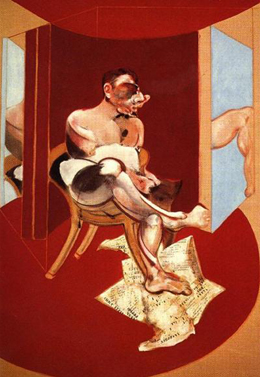
Course Coordinator: Judith Hamilton
Course Leaders: Carlos Rivas, Alireza Taheri
Thursdays, 7:30 pm – 9:30 pm: November 11, 18, 25, December 2, 9, 16, 2021. (6 sessions)
Fee: $360
Deadline for registration is November 4, 2021
Preregistration is required.
** DISTANCE PARTICIPATION ONLY – This course will be conducted online.
Language, speech, and discourse all have effects on the body. The effects of language on the body are articulated in the classical period of Lacan’s teaching in terms of a satisfaction linked to the constitution of the unity of the body in its image in the mirror stage. There is then mortification brought about by the body’s being indicated by signifiers which bring about the death of the thing. In the later Lacan, it becomes clear that the real of the body participates in drive and jouissance and in the cure.
As Jacques-Alain Miller writes: “The satisfaction proper to the mirror stage is the identification of the subject, conceived as original organic disarray, with what I will call a complete body image”. And as Alexandre Stevens writes, in relation to the later Lacan, “We must thus consider that the subject is ‘affected by [affecté de] two discordant bodies’ which are the organism as real, and the body grasped in its unity as an image. The body in its initial presence, as pure organism, as real, is fragmented and it is through the image that it is made One, but it is thus a wholly imaginary One. The only signification here is that of symbolic efficacy reduced to imaginary identification, but it is one that produces the satisfaction of jubilation of the young child in front of the mirror.” The body as indicated in the Borromean knot and then in the sinthome, as for James Joyce, is more complexly understood.
The body in Lacanian psychoanalysis will be presented in various aspects in this course, which will be best appreciated by those who know something about Lacan. Readings will be supplied throughout the course and discussion will be encouraged.
Learning Objectives:
At the end of the course the participants will be able to:
- Outline the various forms of the body – the imaginary, symbolic and real – throughout Lacan’s work.
- Describe the aspects of the body as experienced by people with psychosis.
- Indicate the relation of the form of the body to the psychoanalytic cure.
Judith Hamilton, MD, FRCP, (Psych)
Psychiatrist/Psychoanalyst in Private Practice. She teaches in the ATPPP and in the Extension Program of the TPS. She is a co-founder of Lacan Toronto. Faculty TPS&I.
Carlos Rivas, RP
Studied psychology, philosophy, and social sciences in Venezuela. He trained in Gestalt Therapy, Hypnotherapy, Motivational Interviewing, Focusing, and EMDR, and in 2005 was the recipient of the Venezuelan National Award for Research in Psychotherapy. He has a private practice in psychoanalytic psychotherapy. Member of Lacan Toronto; Guest of the TPS.
Alireza Taheri, PhD, RP
Wrote his dissertation for the University of Cambridge on Nietzsche, Freud, and Lacan. He also holds an MA in philosophy from Essex and an MSc in psychoanalytic thought from University College London. He has done psychoanalytic work in London (UK). He works in private practice in Toronto. Candidate at TIP.
This event is eligible for Section 1 CME credits (0.5 credits/hour). This event is an accredited group learning activity (section 1) as defined by the Maintenance of Certificate Program of the Royal College of Physicians and Surgeons of Canada, approved by the Canadian Psychiatric Association (CPA). The specific opinions and content of this event are not necessarily those of the CPA, and are the responsibility of the organizer(s) alone. As per the Royal College standard, each presentation provides a minimum of 25% interactive learning.
Full-time students in universities and colleges, and mental-health trainees are eligible for a 25% reduction in course fees. Proof of 2021/2022 status needs to be provided. Please contact the tps&i directly to register at a discount.
Refunds must be requested in writing two weeks prior to the beginning of a course. A handling fee of $30 will be retained. After these two weeks, fees cannot be returned.
For more information about and for registration in the tps&i Extension Programs, Scientific Meetings, Training Programs, Study and Supervision groups and Special Presentations, please visit our website: torontopsychoanalysis.com or email info@torontopsychoanalysis.com
